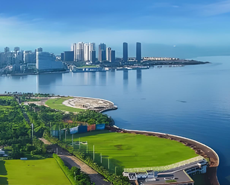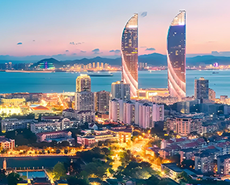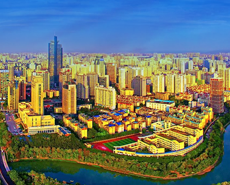Guinean bauxite supply to rise continuously in China for its impressive advantages
----Interview with Zhao Lei, executive vice president of Zibo Rundi Aluminum Industry Co., Ltd.
Located in Zibo, and founded in 2006, Zibo Rundi Aluminum Co., Ltd has independent and free import and export rights, and is the first private enterprise entering Indonesia bauxite industry. Rundi has held the operation of several foreign and domestic companies which takes Aluminum as the core business, and become a comprehensive enterprise with a collection of mining, technology R&D, domestic and foreign trade, online platform, investment and financing, etc.
Asian Metal: According to statistics from China Customs, China imported about 32 million tons of bauxite in the first half of 2017, of which 38%, about 12.18 million tons, was from Guinea which became the biggest bauxite exporter to China. What’s your opinion on the sharply increased bauxite supply from Guinea and what are the main reasons behind this? Will the trend ever continue?
Zhao: Guinea holds the world's largest known reserves of high-quality bauxite currently. In order to meet the normal demand of bauxite in the market under the circumstance that the supply from major origin countries including Indonesia and Malaysia is decreasing, Guinea’s bauxite supply will certainly hold sharply increased market share. This was ultimately determined by the overall market demand trend. With RUSAL, Alcoa, Weiqiao Aluminum, Chalco, Rundi and other aluminum enterprises successively entering Guinean market for competition, the overall mining of bauxite in Guinea will be bound to witness continuous development. Besides, there exists huge demand gap in global market. Therefore, the market will necessarily see more shares of Guinea’s bauxite supply with good increasing trend for at least 5-8 years.
Asian Metal: What do you think are the main competitiveness of Guinea’s bauxite supply compared with that of other countries?
Zhao: Industry insiders have long known the main competitiveness of Guinea’s bauxite supply which includes:
1. Large amount of proven bauxite reserves of about 24 billion tons, accounting for 40% of the world’s total bauxite reserves;
2. Low costs of development;
3. Guinea issued and implemented the new Mining Law in 2011 which strengthened the impact of mining industry on the state. The new mining law was designed to promote development of mining industry, attract stable investment and streamline work procedures.
Asian Metal: Guinea’s bauxite projects have been developed at a faster speed since last year with more projects expected to be put into production in 2018. Is Rundi participating in any of the development of such projects in Guinea? If so, can you brief us on some details of the projects like shareholders, locations, reserves as well as the development progress (for example: the construction of infrastructure including railway and wharf)?
Zhao: Yes. Our project is located at two mines of No.138 mining area in Fria, Guniea. One of the projects has detected reserves of 484 million tons with the total mining capacity for the two projects likely increasing to 1 billion tons of bauxite (Al2O3>45%, Si02<2%).
Rundi also registered a company in Conakry, Guinea with two shareholders including itself. The other local shareholder mainly takes charge of the mining and DSO business of bauxite in Guinea.
We have established strategic cooperation with CCCC First Harboar Consultants Co., Ltd. (FDINE) and Northern Heavy Industries Group Co., Ltd. which will mainly be in charge of the operation, design and construction of the projects.
Asian Metal: What’s the total investment budget for the whole projects and how is the financing going currently?
Zhao: Rundi’s total investment budget for projects in Guinea is about USD500 million. We have completed the first round of financing oriented towards elite partners in the aluminum industry. About nearly 200 customers showed interest in the investment and we chose 40 investors after careful consideration. In addition, we are deeply sorry for those who failed to participate in the investment of shares of the projects.
We will implement the second round of financing plan according to specific progress of the projects, and we welcome investors with investment intent to pay attention to our projects.
Asian Metal: When will Rundi put Guinea projects into production and what is the designed annual capacity for the projects? Is Rundi currently beginning to seek marketing channel?
Zhao: We plan to put the projects into production from late 2019 with annual output expected to be 15-20 million tons. We have already been in touch with some potential partners.
Asian Metal: Faced with so many investment projects, what’s your prediction of Guinea’s bauxite supply to China in two years? Will China have such a strong demand for the material in the future?
Zhao: It is expected that Guinea will supply 100 million tons of bauxite to China by 2020 and China’s demand for the material is likely to keep growing due to the following reasons:
1) China is still the world’s biggest producer of aluminum products of which the output is increasing.
2) There are not enough supplies of high-quality bauxite in China to meet the demand from domestic aluminum plants. Besides, China is expected to exhaust all domestic bauxite resources in 10 years. Chinese government encourages domestic enterprises, especially alumina plants, to invest overseas bauxite mine.
3) Indonesia stopped exporting bauxite to China from 2004.
4) China needs bauxite supply originating from Pacific Coast and Atlantic Coast within 5 years as from 2016.
Therefore, the global market is likely to see fast increasing exportable high-quality bauxite and Guinea can just meet these requirements as well as the further increasing demand for bauxite in the near future.
Asian Metal: Beyond that, what else do you think are the challenges Guinea faces for developing bauxite mine?
Zhao: Firstly, The traffic environment needs to be improved; secondly, the change of term of office can also be a challenge.
















